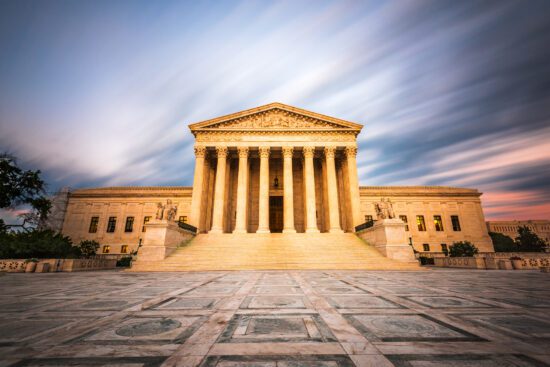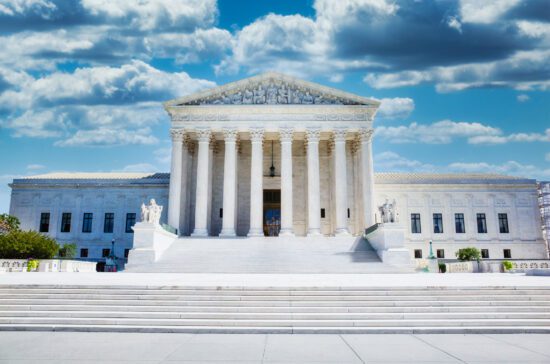During his long and illustrious career, the late Justice Antonin Scalia wrote hundreds of thousands of words and delivered hundreds of hours worth of speeches. While there are dozens that could be considered essential, there are two speeches in particular that I believe every American citizen should be familiar with.
The first is “Judicial Adherence to The Text of Our Basic Law: A Theory of Constitutional Interpretation,” a speech given at the Catholic University of America on October 18, 1996. The second is “Constitutional Interpretation the Old Fashioned Way,” which was delivered at the Woodrow Wilson International Center for Scholars in Washington, D.C., on March 14, 2005.
There is considerable overlap between the two speeches since the latter seems to be a revision of the former. But taken together they present not only Justice Scalia’s views on judicial interpretation, but also a prescient analysis of the failures of the modern judicial system and a prophetic warning about the future of the U.S. Constitution.
Although I would highly recommend reading both speeches in their entirety, the following is a summation of the major themes and a selection of the key quotes. Excerpts are marked with “C” when taken from the speech and Catholic University and “W” when taken from the Woodrow Wilson International Center address:
What “originalism” is—and is not — Originalism, explains Scalia, is a “manner of interpreting the Constitution is to begin with the text, and to give that text the meaning that it bore when it was adopted by the people.” He clarifies that this is not synonymous with “strict constructionism”: “I do not think the Constitution, or any text should be interpreted either strictly or sloppily; it should be interpreted reasonably.”(W)
Scalia also rejected the notion of “original intent.” As he explained,
You will sometimes hear [originalism] described as the theory of original intent. You will never hear me refer to original intent, because I am first of all a textualist, and secondly an originalist. If you are a textualist, you don't care about the intent, and I don't care if the Framers of the U.S. Constitution had some secret meaning in mind when they adopted its words. I take the words as they were promulgated to the people of the United States, and what is the fairly understood meaning of those words.
I do the same with statutes, by the way, which is why I don't use legislative history. The words are the law. I think that's what is meant by a government of laws, not of men. We are bound not by the intent of our legislators, but by the laws which they enacted, laws which are set forth in words, of course. (C)
Originalism was once judicial orthodoxy — While originalism is now a minority view among judges, it was, until about 50 years ago, considered the orthodox method of judicial interpretation. Even the American people had an originalist perpective of the Constitution.
As an example, Scalia points to the 19th Amendment, which is the amendment that gave women the vote.
It was adopted by the American people in 1920. Why did we adopt a constitutional amendment for that purpose? The Equal Protection Clause existed in 1920; it was adopted right after the Civil War. And you know that if the issue of the franchise for women came up today, we would not have to have a constitutional amendment. Someone would come to the Supreme Court and say, “Your Honors, in a democracy, what could be a greater denial of equal protection than denial of the franchise?” And the Court would say, “Yes! Even though it never meant it before, the Equal Protection Clause means that women have to have the vote.”
But that’s not how the American people thought in 1920. In 1920, they looked at the Equal Protection Clause and said, “What does it mean?” Well, it clearly doesn’t mean that you can’t discriminate in the franchise — not only on the basis of sex, but on the basis of property ownership, on the basis of literacy. None of that is unconstitutional. And therefore, since it wasn’t unconstitutional, and we wanted it to be, we did things the good old-fashioned way and adopted an amendment. (W)
“Immutability was regarded as its characteristic,” he adds, “What the Constitution meant when it was adopted is what it means today, and its mean- ing doesn't change just because we think that meaning is no longer adequate to our times.” (C)
If we find the Constitution's meaning to be inadequate, he says, we as Americans can simply amend the document.
Originalism has been replaced with the “Living Constitution” — When originalism was the accepted theory of interpretation, activist judges had to resort to lying about the meaning of the Constitution to get the outcome they wanted, says Scalia. But now that the Constitution is considered to be a document that is living and evolving, the courts don’t even have to resort to deception — they can simply interpret the meaning to be anything they want. The result:
All sorts of rights that clearly did not exist at the time of the adoption of the Constitution and the Bill of Rights exist today. It's plain absolutely plain, that the right to an abortion was not thought to exist in 1791 or at the time that the post-Civil War amendments were adopted, since there were laws against abortions in all the states. It's absolutely plain that there was no right to die, since there were laws against suicide. And you can go right down the list. (C)
How “Substantive Due Process” led to federal protection of same-sex marriage and abortion on demand — Substantive due process, which Scalia calls a “contradiction in terms,” is a principle which allows courts to protect certain rights deemed fundamental from government interference under the authority of the due process clauses of the Fifth and Fourteenth Amendments to the Constitution.
What substantive due process is is quite simple — the Constitution has a Due Process Clause, which says that no person shall be deprived of life, liberty or property without due process of law. Now, what does this guarantee? Does it guarantee life, liberty or property? No, indeed! All three can be taken away. You can be fined, you can be incarcerated, you can even be executed, but not without due process of law. It’s a procedural guarantee. But the Court said, and this goes way back, in the 1920s at least, in fact the first case to do it was Dred Scott. But it became more popular in the 1920s. The Court said there are some liberties that are so important, that no process will suffice to take them away. Hence, substantive due process.
Within the last 20 years, we have found to be covered by due process the right to abortion, which was so little rooted in the traditions of the American people that it was criminal for 200 years; the right to homosexual sodomy, which was so little rooted in the traditions of the American people that it was criminal for 200 years. So it is literally true, and I don’t think this is an exaggeration, that the Court has essentially liberated itself from the text of the Constitution, from the text and even from the traditions of the American people. It is up to the Court to say what is covered by substantive due process. (W)
Both liberals and conservatives embrace the Living Constitution — As Scalia notes, “Conservatives are fully as prepared as Liberals to create new rights under this evolutionist theory of the Constitution.” (C) The dividing line is not between liberals and conservatives but between those who think the meaning of the text is fixed and those who believe it continuously evolves to meet the needs of society.
A crash course in Marbury v. Madison — One of the most helpful sections in these speeches is Scalia’s explanation of Marbury v. Madison, the Supreme Court case that gave us judicial review:
The only reason federal courts sit in judgment of the constitutionality of federal legislation is not because they are explicitly authorized to do so in the Constitution. Some modern constitutions give the constitutional court explicit authority to review German legislation or French legislation for its constitutionality, our Constitution doesn’t say anything like that. But John Marshall says in Marbury v. Madison: Look, this is lawyers’ work. What you have here is an apparent conflict between the Constitution and the statute. And, all the time, lawyers and judges have to reconcile these conflicts — they try to read the two to comport with each other. If they can’t, it’s judges’ work to decide which ones prevail. When there are two statutes, the more recent one prevails. It implicitly repeals the older one. But when the Constitution is at issue, the Constitution prevails because it is a “superstatute.” I mean, that’s what Marshall says: It’s judges’ work. (W)
Problems arise, however, when we don’t treat the Constitution as a text with a fixed meaning:
If you believe, however, that the Constitution is not a legal text, like the texts involved when judges reconcile or decide which of two statutes prevail; if you think the Constitution is some exhortation to give effect to the most fundamental values of the society as those values change from year to year; if you think that it is meant to reflect, as some of the Supreme Court cases say,
particularly those involving the Eighth Amendment, if you think it is simply meant to reflect the evolving standards of decency that mark the progress of a maturing society — if that is what you think it is, then why in the world would you have it interpreted by nine lawyers? What do I know about the evolving standards of decency of American society? I’m afraid to ask.
If that is what you think the Constitution is, then Marbury v. Madison is wrong. It shouldn’t be up to the judges, it should be up to the legislature. We should have a system like the English — whatever the legislature thinks is constitutional is constitutional. They know the evolving standards of American society, I don’t. So in principle, it’s incompatible with the legal regime that America has established. (W)
The Living Constitution replaces our representative democracy with an out-of-touch oligarchy — Why should nine justices determine how society is “evolving”? After all, notes Scalia, he himself was out of touch with the American people:
I'm not very good at determinating what the aspirations of the American people are. I am out of touch with the American people. I don't even try to be in touch. People mention movie stars and I don't know who they're talking about, and I get a blank look on my face. If you want somebody who's in touch with what are the evolving standards of decency that reflect a maturing society, ask the Congress to make the relevant decisions.
And of course that's the way it's done in the United Kingdom. The Parliament says what the English Constitution consists of.
So, if you really believe in the evolving theory, and you're right about this, then we made a mistake in Marbury v. Madison, and the Supreme Court shouldn't stick its nose into this stuff at all. It should be up to the Congress to determine where we evolve. What makes you think a committee of nine lawyers ought to tell where we're evolving to? I'm a philosophy minor, but I didn't train as a philosopher. I'm just a lawyer, just between you and me. That's what I'm really good at. (C)
Originalism confines judges, and limits them to the meaning of the text. But under the theory of the Living Constitution, judges are given the power to govern the American people:
What is the criterion that governs the Living Constitutional judge? What can you possibly use, besides original meaning? Think about that. Natural law? We all agree on that, don’t we? The philosophy of John Rawls? That’s easy. There really is nothing else. You either tell your judges, “Look, this is a law, like all laws, give it the meaning it had when it was adopted.” Or, you tell your judges, “Govern us. You tell us whether people under 18, who committed their crimes when they were under 18, should be executed. You tell us whether there ought to be an unlimited right to abortion or a partial right to abortion. You make these decisions for us.” I have put this question — you know I speak at law schools with some frequency just to make trouble — and I put this question to the faculty all the time, or incite the students to ask their Living Constitutional professors: “Okay professor, you are not an originalist, what is your criterion?” There is none other. (W)
The Living Constitution kills the actual Constitution — When judges abandon originalism and the original meaning to the text of the Constitution, it is merely a matter of time before the Constitution itself is abandoned.
In the long run, non-originalism triumphant and rampant is the death knell of the Constitution. As I suggested earlier, the whole purpose of the Constitution is to prevent a future society from doing whatsoever it wants to do. To change, to evolve, you don't need a constitution. All you need is a legislature, as well as a ballot box. Things will change as fast as you want. You want to create new rights and/or destroy old ones? A legislature and the electoral franchise are all that you need. The only reason you need a constitution is because there are some things which you don't want a majority to be able to change.
That's my most important function as a judge in the American legal system. I have to tell the majority to take a hike. I tell them: “I don't care what you want. The Bill of Rights says you cannot do it.”
Now, if there is no fixed absolute, if the Constitution evolves to mean what it ought to mean today, what makes you think the majority is going to leave it to judges to decide what the Constitution ought to mean? The people comprising the popular or legislative majority will do that only if they think the decisions of the courts will be supportive of their particular interests, values, and opinions. If there are no fixed legal standards, if the justices on the Supreme Court are supposed to tell us what are the evolving standards of decency that reflect a maturing society, a majority of the people and its political leadership will look for judges who agree with the majority as to what the Constitution means. And so we will have the absolutely crazy system in which we conduct a mini-plebiscite on the meaning of the Constitution every time we select a person to fill a vacancy on the Supreme Court.
Why nominations to the Supreme Court have become of existential importance to our nation — When Scalia was nominated for the Supreme Court, he was approved by the Senate 98-0. He explains why that can’t happen today:
Today, barely 20 years later, it is difficult to get someone confirmed to the Court of Appeals. What has happened? The American people have figured out what is going on. If we are selecting lawyers, if we are selecting people to read a text and give it the fair meaning it had when it was adopted, yes, the most important thing to do is to get a good lawyer. If on the other hand, we’re picking people to draw out of their own conscience and experience a new constitution with all sorts of new values to govern our society, then we should not look principally for good lawyers. We should look principally for people who agree with us, the majority, as to whether there ought to be this right, that right and the other right. We want to pick people that would write the new constitution that we would want.
And that is why you hear in the discourse on this subject, people talking about moderate, we want moderate judges. What is a moderate interpretation of the text? Halfway between what it really means and what you’d like it to mean? There is no such thing as a moderate interpretation of the text. Would you ask a lawyer, “Draw me a moderate contract?” The only way the word has any meaning is if you are looking for someone to write a law, to write a constitution, rather than to interpret one. The moderate judge is the one who will devise the new constitution that most people would approve of. So, for example, we had a suicide case some terms ago, and the Court refused to hold that there is a constitutional right to assisted suicide.
We said, “We’re not yet ready to say that. Stay tuned, in a few years, the time may come, but we’re not yet ready.” And that was a moderate decision, because I think most people would not want — if we had gone, looked into that and created a national right to assisted suicide, that would have been an immoderate and extremist decision. (W)
The Living Constitution + Majoritarianism = Recipe for Destruction — The Living Constitution has only been around for about 50 years. But it is already appears poised to undermine 200 years of the rule of law:
The Bill of Rights is devised to protect you and me against, who do you think? The majority. My most important function on the Supreme Court is to tell the majority to take a walk. And the notion that the justices ought to be selected because of the positions that they will take, that are favored by the majority, is a recipe for destruction of what we have had for 200 years.










